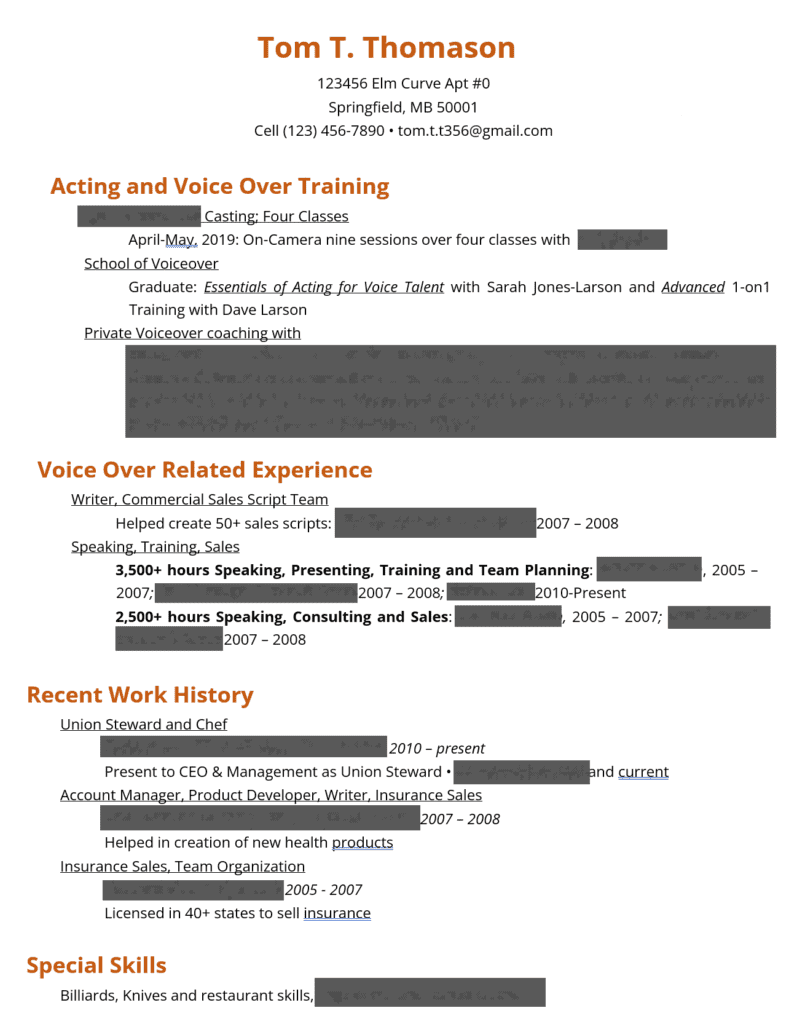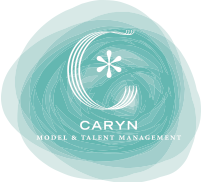First, read How to Contact an Agent. Looking for the submission pages of Twin Cities voice over talent agencies? Click this button:
There are several strategies for getting the best agent you can, but the simplest is what we call, “Get in, Move up:” Get a beginning agent, then get a better agent.
However, before you seek a voiceover agent, there are THREE keys:
- You must have relevant skills and experience from voiceover training or work.
- Look as much like an experienced, working actor with agency experience as reasonably possible.
- Learn the rules, exceptions and biases for each agency you submit to.
Take every shortcut you can—as long as you make no errors. Different cities and different agencies have different rules and biases. We’ll cover two dozen of the main North American cities with voice over agencies. There is a list of agencies across North America here. The more experience you already have, the more you can skip ahead in these steps. Steps 1-5 below apply to all cities.
Finally, realize that the loss of what some saw as the core of the agency system in 2017/2018—VoiceBank—has meant that agencies all over the U.S. have far fewer auditions to offer to their talent, and “exclusive” auditions that used to only go through agencies via the VoiceBank system now can be found OUTSIDE agencies. In short, it is far less directly beneficial to have an agent than it used to be, but it is still beneficial.
1. Get VO Experience or Training Working LIVE
No matter what type of voice over you think you prefer, you must develop skill in commercial voice over. With the exception of skilled actors working as audiobook narrators, no one wants to work with a voice talent who can’t make money in commercials, regardless of your other interests.
To work in commercial voiceover, you must have a few hours of live experience on mic with a director/producer/coach. You must develop SKILL, not knowledge. Live recorded training with an industry pro directing is best, but paid work experience being directed is the next best thing.
Commercial voiceover means knowing how to do cold read auditions, then for a gig, work in a booth with one or more directors for 15-90 minutes. If you don’t know how to handle cold reads and repeated tedious, confusing directions in a skilled and professional manner, stay away from agency work and concentrate on online work.
Learning by lecture or submitting audio and getting tips afterward are useless until you have some years of experience. Think of riding a bicycle. Reading about it or sending in pictures of yourself falling on the ground are not helpful. You must DO it. Even then, being able to stay on without falling off is only the very first step.
2. Learn How to Practice and Troubleshoot Problems
Everyone gets worse with practice. (It sounds counter-intuitive but it’s TRUE.) Do you know what your bad habits are? Have you eliminated the small and large errors you make every time you read? If not, practicing locks in your bad habits until they get harder and harder to eliminate. You will fix one thing while making two other things worse. You MUST:
- Practice authenticity more than anything else.
- Have a customized personal system for performing and practicing. Top pros have specific systems just for warming up.
- Practice articulation, accent, pronunciation and speech patterns separately from acting.
- Get regular feedback on your authenticity whether from friends and family or pros.
Sample Non-Actor’s Resume
click to enlarge:
3. Expand the “Related Experience” Resume Section
Assume your resume will only be skimmed. Skill and reputation matter, not resumes. So keep it to one page. Besides a brief job history and education summary at the bottom, your resume should include a section each for • Experience • Related Experience • Training Whichever is most impressive goes first.
► To convert an existing resume into a voice over resume, your main job is to add more ultra-brief summaries to your “Related Experience” section.
Find Related Experience
If you have lots of acting experience, only include that, and skip these directions. Otherwise briefly summarize everything, including old minor related experience. Yes, everything! Make a list, going back to grade school of all the purposeful talking you have done. And any commercial, sales or marketing-related writing. On stage, in business meetings, volunteering, sales, video game live streaming, sales scripts, organizing, DJing, in radio, training…everything.
ESTIMATE and summarize
- NUMBER of times/items. This is MOST important. Don’t just say “did some things over the last eight years”. If for example, teaching, separate (break out) length of time working 1-on-1 vs speaking to a group, vs doing non-speaking and non-writing activities.
- Total hours
- Roles
- Relevant months/years
These items can look something like this:
- 27 hours since 2018: Corporate meeting presentation/discussion • 7 roles in 19 theater performance • 135 hours live radio performance, 3 stations, since 2017 • 500+ sales calls/presentations
Create ESTIMATES. Don’t get hung up on exactness, just do your best. The more recent or strong or relevant the experience, the more detail is needed. Very relevant experience can get its own line. Radio experience should be minimized, not omitted. Voice over agents are biased against radio experience, in general.
Regarding resume format: NOT a big deal. But if you want some professional resume ideas, here are a few.
Don’t Exclude Any Experience
The older and less relevant the experience, the more you should simply summarize it, but don’t exclude anything! Include grade school theater and girl scout sales, just don’t call it that.
If you do any live performing as part of training (such as some improv classes provide), include the performing under relevant experience, and the rest under training. Anything that is or looks like voice over experience goes under the “Experience” section.
4. Ask Pros for Advice
This is good in all cities, but is crucial in cities with only 1-2 good voice over agencies, such as Austin, Charleston, Denver, Frederick, Houston, Madison, Miami, Milwaukee, Salt Lake City, Tampa Bay, Washington DC, and Winnipeg.
Before speaking to anyone, be prepared to summarize your key experience in just a few words, e.g. “I’ve worked a lot in theater and sales” in case you get a discussion with someone significant in the industry, such as an agent.
Always read agency websites before contacting agencies! Then call each local agency and say something such as, “the website recommends X for training, are there any other classes you also recommend?” Then summarize your key experience in just a few words and ask “The website says to submit a demo, is there anyone (or anyone else, if their website lists someone) you recommend to record a voice over demo?” Then thank them and get off the phone.
Then call whoever they recommend for training or demos and then, in this order:
- Tell them your experience and ask what they would recommend.
- Ask their opinion of different agencies.
- Ask them to explain why they train the way they do.
Do NOT believe what any one person says, simply make a note. If they recommend training that includes a demo, or if they don’t do live recorded training, assume the other things they say are less trustworthy as well.
This way you will have contacted several key local pros, may actually get the interest of someone in the industry, and will know more clearly what to do and NOT do to get the interest of a local agent, which agency might be best for you, etc. You may learn of some things that are allowed that websites do not list, get some idea of what local biases are, etc.
5. Get Related Acting Experience
In addition to voiceover training or experience, do some (or more of) one or more of these kinds of acting: Improv, Stand-up, Theater, On-Camera. YouTube or Podcasting counts as acting particularly if done in a way that emphasizes your personality.
Getting In With Related Experience
Agents look for new talent from experienced existing talent (e.g. on-camera in the agency), or within the industry. This is true in all cities. Getting represented for print or on-camera is generally easier than for voiceover, so if this is an option for you, work to get a print or on-camera agent at an agency that represents for voiceover, and once you’re in, ask the voice over agent for advice.
6. Know and Follow the Rules for Commercial Demo Clips
Your initial goal is to post three or more commercial sample clips (your voice with music backing) on a free website with your name on it. Here are the rules. Some agencies will listen even if they state they require a full demo, and you may be able to get feedback to guide you in creating a full demo if needed. Remember, a full demo is worthless if you don’t have three great clips to start with.
7. Get Into the Agency World
If you are not currently acting for pay, don’t have much experience, and aren’t ready for print or on-camera work, take some steps to look more professional:
Look Like a Pro
Invest $80-$150 into home recording equipment and get work at a free-to-join online marketplace. List clients on your website and resume. Consider learning how to raise your price and compete for higher-paying work online after you get a few easy-to-get clients.
At this point, you are trained and have at least have a website with a partial demo, and some clients listed. If you are in a city with several agencies that represent for voiceover, it might be time to try to get a lesser agent, and then get a better agent later. If this doesn’t work, try step 8 and get more training.
This is a good strategy for cities such as Chicago, the Twin Cities, San Francisco, Dallas, and possibly Atlanta, Charlotte, and Seattle.
While it’s generally true you should follow submission rules exactly, many people have gotten their initial agent without a full demo even when the agency website say a fell demo is required. Having experience, clients and related experience can get the interest of an agent even when you don’t yet have a full demo.
Of course, you are shortchanging yourself, and your income potential will suffer. You will need to raise your skill level to where you are able to perform well enough to have a great complete demo. And if you don’t follow submission rules exactly, you may seem clueless to better agencies, and will have to wait 6 months to a year before they will consider you again. Nonetheless, this is how some people get their first voiceover agent.
Then, once you think you are ready, try to get a better agent.
8. Get Advice From Mentors
This is most important in big voiceover cities such as Los Angeles (LA), New York, Toronto or Vancouver. Before you move to one of these cities, complete steps 1-6, and then start networking:
UPDATE 1/2020: As of Jan 1, it is illegal for California contractors to create more than 35 pieces of content in a year for a single company, unless the outlet hires them as an employee.
BE A REAL PERSON ON SOCIAL MEDIA: Ask and answer questions; introduce people to one another; be a helper and connector. Recommend your friend’s activities. Ask for help and help others. Post positive things about your work, goals, likes and loves.
FIND TALENT WHO TALK: Search agency listings, cross-reference on LinkedIn, then find as many represented talent as you can on Twitter (best) or Facebook. Study their social media profiles to see who chats. Study their links and posts. Look for anything you share in common: States/cities lived in, affiliations, people you know in common, etc.
HELP THEM & THEIR FRIENDS: Share, like, retweet their posts. Comment positively or helpfully. Only then follow or friend. Eventually ask questions/for suggestions similar to those they have answered before.
GET MENTORED: Share your goals and questions publicly and see who responds. Continue conversations privately. Try connecting privately to those who do not respond publicly. Don’t be a pest!! Thank them and praise them. Look for ways to connect. People like being known as wise mentors, so treat them that way.
If you are an experienced actor, after you’ve moved to one of these cities, join Central Casting or the top local casting agency and read listings EARLY and get on set early.
Finally, follow the advice of your mentors!
Twin Cities Voice Over Talent Agencies
Each of these logos links to the submission rules for new talent:
How to apply to Moore Creative Talent, Inc.
Apply to Caryn by emailing the following info to Mel Carretero, Talent Agent, Voice Division (replacing Amber Blaufuss):
| Name | Age Range |
| Ethnicity | |
| Phone | Languages/Accents |
| Address | Union and/or Non-Union |
| Website with voice samples | Home Studio and/or ISDN |
Do not use carynmodels.com/apply for voice over

How to apply to Wehmann Models & Talent Inc.
How to apply to the Meredith Agency
Short version: Submit your demo & resume to agents@meredithagency.com

To apply to join the talent roster at
Buzz Cutz Audio, call 612-333-2899
Agency Models & Talent Inc.
They prefer to do voiceover with print/on-camera talent
they already represent for print or on-camera.








Recent Comments